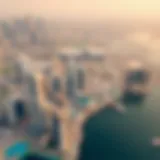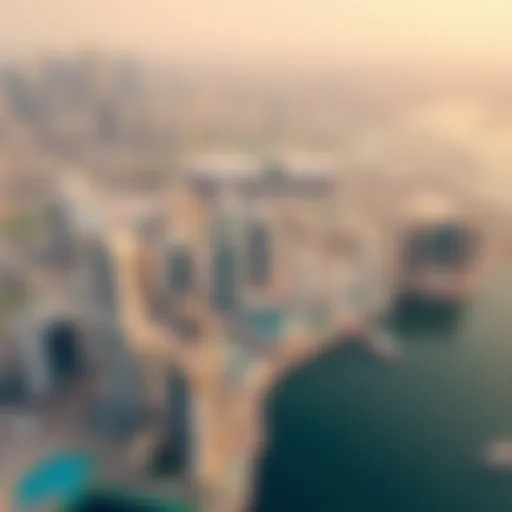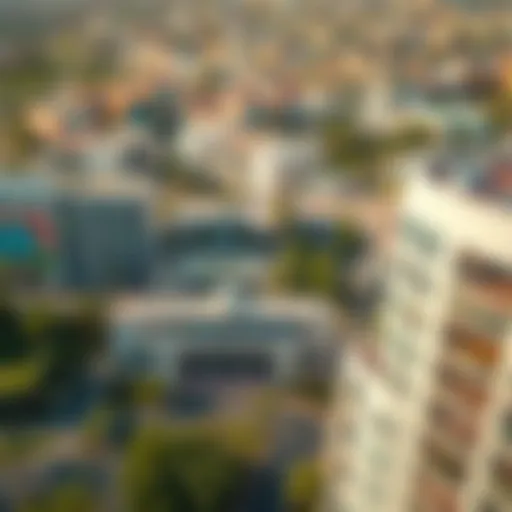Exploring Dubai's Design District: A Hub of Innovation
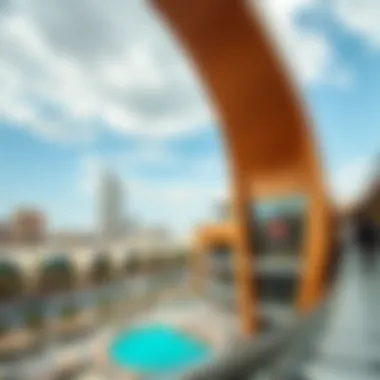
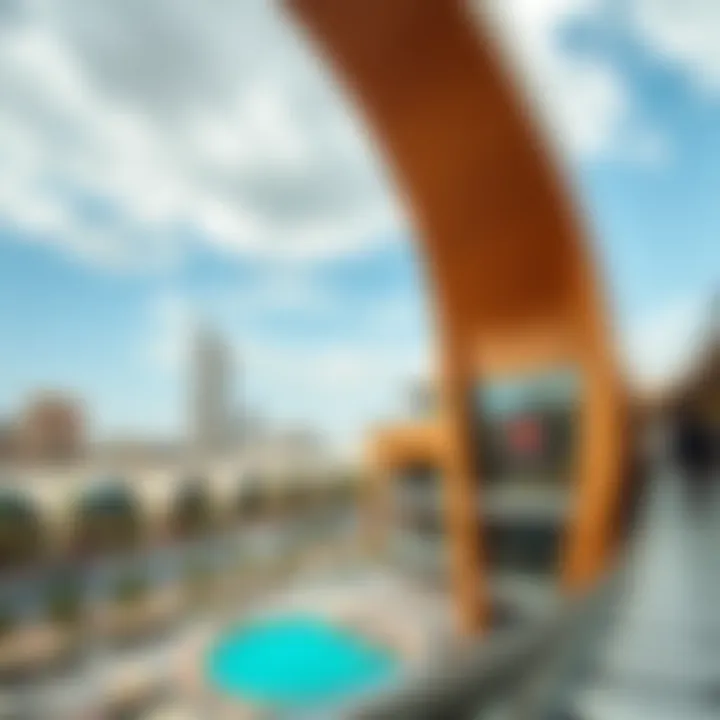
Intro
The Design District in Dubai, known as Dubai Design District (d3), stands out as a unique enclave where creativity flourishes and innovative architecture reshapes urban living. This slice of Dubai offers an inviting canvas for artists, designers, and entrepreneurs alike. The strong pulse of this area speaks to the city’s commitment to positioning itself as a global hub for creativity and culture.
This article will guide you through the intricacies of the Design District, diving into its historical context, significant projects, and economic impact. It will also examine various stakeholders that play vital roles in shaping this vibrant space while providing actionable insights tailored for investors, homebuyers, agents, analysts, and developers exploring opportunities within this realm.
By the end of this discussion, readers will come away with a nuanced understanding of current market trends, property types, and innovative initiatives that define Dubai’s Design District, and how these facets interlace to create a dynamic ecosystem contributing to Dubai’s architectural identity.
Market Trends
Current Real Estate Trends in Dubai
The property market in Dubai has undergone significant transformations, particularly within the Design District, where creative energy attracts diverse talent and investment. As of late 2023, the area has seen a growing interest in both commercial and residential real estate. Factors such as the influx of international businesses and a burgeoning cultural scene have catalyzed this growth.
- Demand for commercial spaces has surged, driven by startups and established firms desiring proximity to designers and artists.
- Residential properties in the vicinity are increasingly sought after by professionals who want to immerse themselves in this lively environment.
Interestingly, the shift towards remote work has also spurred demand for adaptable workspaces, further influencing real estate dynamics in the district. Investors might find opportunities in co-working environments or mixed-use developments that cater to this evolving need.
Future Forecasts for the Dubai Property Market
Looking ahead, the trajectory of the Design District seems promising, as urban development spruces up not only aesthetics but also market values. Analysts predict that, in the coming years, the area will flourish thanks to:
- Ongoing investments in infrastructure enhancement, making accessibility a key feature.
- Increased foreign investment due to favorable government policies promoting business in the region.
Such developments are likely to enhance the overall appeal of the district, fostering not just a place of living, but a significant destination for tourists and professionals alike, which is essential in understanding the identity and uniqueness of the area.
Property Types
Residential Properties: Overview and Insights
As the Design District continues to evolve, the residential offerings reflect a blend of luxury and functionality. The properties here encapsulate modern living while also prioritizing community aspects—an essential part of the district's charm. Buyers can expect:
- Contemporary apartments with high-end finishes.
- Trendy townhouses offering private gardens and community amenities, catering to families.
Living in the Design District means being surrounded by art galleries, cafes, and parks, which enhance the overall living experience. Investors eyeing residential properties should consider the growing demand for sustainable living options, as potential buyers show a preference for eco-friendly developments.
Commercial Properties: Opportunities and Challenges
On the flip side, commercial real estate plays a pivotal role in the Design District's ecosystem. Here, businesses thrive alongside creative enterprises. There’s much to explore in this segment:
- Opportunities:
- Challenges:
- Growth in co-working spaces that cater to freelancers and startups.
- A potential rise in collaboration opportunities as industries converge in this vibrant community.
- Increased competition amongst businesses vying for prime locations.
- Navigating government regulations and securing necessary permits for new enterprises.
Ultimately, while the opportunities in commercial properties are plentiful, understanding the landscape, including legal frameworks and market demands, will be crucial for any potential investor or developer.
"Dubai Design District serves as a gateway for realizing architectural dreams while reflecting the ever-evolving nature of urban modernity."
Preamble to the Design District
The Dubai Design District (d3) stands as a testament to the city’s ambition, pushing boundaries in the realms of architecture, art, and design. This vibrant hub is not just a place; it is a mindset that draws creatives from all over the globe. In an era where innovation fuels economic growth, understanding the significance of this district is crucial for investors, homebuyers, and professionals alike. The Design District serves as a focal point for those keen on tapping into Dubai's dynamic market, brimming with opportunities for collaboration, investment, and cultural exchange.
A globally recognized hub, d3 intertwines commerce and creativity. With a well-curated mix of design studios, retail outlets, and galleries, it offers a multifaceted experience. The intersection of creativity with architectural brilliance is evident here, creating a ripple effect across the city. The importance of the Design District is manifold; it hosts events that feature both local and international talent, immersing visitors in an atmosphere charged with innovation.
Defining the Concept of a Design District
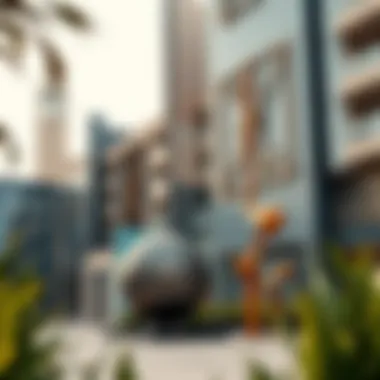
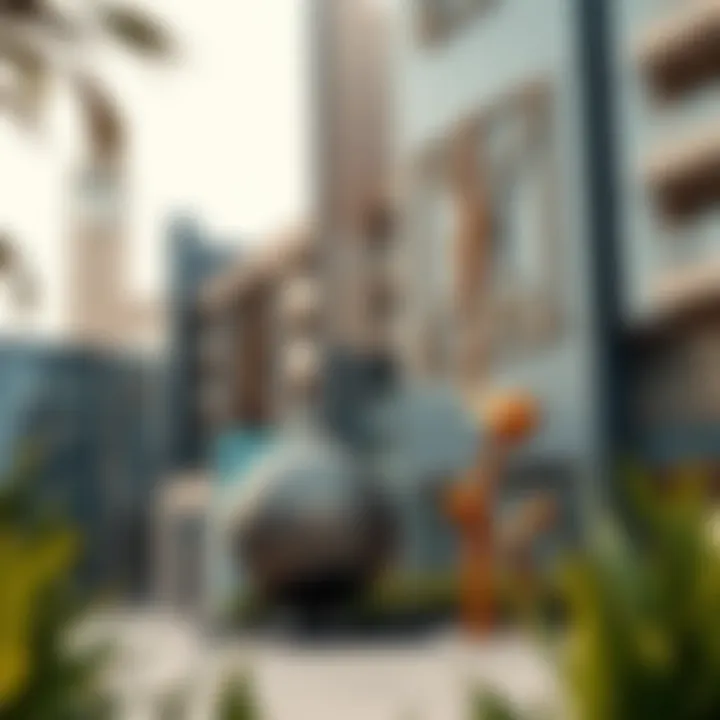
A design district isn't merely geographic—it's about cultivating a community where creativity thrives. At its core, a design district enables collaboration among artisans, designers, and businesses, fostering a rich environment conducive to innovation. Think of d3 as the beating heart of Dubai’s creative landscape; it acts as a melting pot where ideas collide and evolve, producing singular designs and artistic expressions that resonate worldwide.
Moreover, the purpose of having a distinct Design District isn't just to showcase works of art but to promote a robust dialogue between varied creative disciplines. This dialogue sparks growth in industries, helps businesses flourish, and turns out talent that contributes to Dubai's esteemed reputation as a world-class city.
Historical Overview of Dubai's Design Initiatives
Dubai has always been a nexus of transformation, and its design initiatives reflect a broader narrative of ambition and vision. The establishment of the Dubai Design District in 2013 marked a pivotal moment in fostering a structured environment for the arts and design sector. With the aim of making Dubai a global capital for design, the initiative rapidly gained traction, supported by the government’s commitment to diversify its economy.
From the fundamentals—the integration of art into urban planning—to the launch of the Dubai Design Week, which showcases local and international architects and designers, the historical context offers a rich backdrop to the present vibrance of d3. The initiatives have effectively melded tradition with contemporary styles, creating an identity unique to Dubai.
This history is not just about the past; it serves as a lens through which we can understand future possibilities. The developments over the years reveal a commitment to sustainability and innovation that is reflected in the architectural marvels found in the district today.
In summary, understanding the Design District requires delving into its foundations, recognizing both the collaborative spirit and the rich historical context that shape its continued evolution. As we move deeper into the art and culture that define this hub, one can appreciate the intricate tapestry that makes Dubai’s Design District a true epicenter of creativity.
The Role of Art and Culture
Art and culture play a pivotal role in the fabric of Dubai's Design District. They elevate the area's identity, making it not just a commercial hub but a dynamic space where ideas bloom and creativity thrives. This intersection of art and community engagement drives innovation, inspiring not just those working within the sector but also attracting visitors and investors from across the globe.
Art installations dot the streets, adding a layer of vibrancy that reflects both local heritage and global trends. This visual dialogue helps weave a story that resonates throughout the community, infusing it with character and fostering a sense of belonging. With its open-air galleries and interactive installations, the Design District becomes a living canvas, engaging audiences in unique ways.
Cultural events punctuate the calendar, allowing talents to showcase their work while inviting conversations around contemporary issues, aesthetics, and societal change. This synergy between art and culture not only enhances the aesthetic appeal but also amplifies the area's appeal to potential investors and future residents.
"In the Design District, every brushstroke and architectural line tells a story, merging imagination with the innovative spirit of Dubai."
Prominent Art Installations and Exhibitions
Within the Design District, art installations reflect the diverse influences shaping Dubai's ethos. Take, for example, The Canvas Project, an initiative that invites local and international artists to transform blank walls into remarkable murals. Each piece is more than just visual appeal; it usually conveys a narrative that speaks to the history or aspirations of the community.
Exhibitions at renowned venues like the Dubai Design Museum often draw attention from enthusiasts and critics alike. Here, artists push boundaries, experimenting with medium and concept. Exhibitions aren't just displays; they're platforms for dialogue, allowing artists to interact with audiences, garner feedback, and foster connections that might propel their careers to new heights.
Additionally, annual events like Art Dubai showcase not just photographs and sculptures but also push the envelope in terms of performance art and installations. Visitors, including art connoisseurs and casual observers, find themselves captivated by the range of expression that opens their eyes to broader cultural narratives.
Cultural Festivals and Their Impact
Cultural festivals serve as an essential catalyst for community engagement in the Design District. Events like the Dubai Art Season unite artists, curators, and the public, creating an atmosphere that fosters collaboration and innovation. These festivals provide a platform for discussions around trends in art and design, shining a spotlight on emerging talents and often introducing fresh perspectives on established practices.
Moreover, these festivals propel economic activity within the district. Foot traffic increases significantly during such events, benefiting local businesses, from cafés serving specialty dishes to boutiques offering unique handmade goods. This ripple effect creates an ecosystem where creativity fosters economic growth, making it beneficial for all stakeholders involved.
The impact of these cultural initiatives extends beyond mere economics. They create enduring bonds within the community, breaking down barriers and building bridges between various artistic disciplines. For investors, understanding this interplay is crucial, presenting opportunities that stretch far beyond monetary gains, as they take part in nurturing an environment that nurtures the creative spirit of Dubai.
Significant Architectural Developments
Dubai's Design District represents a transformation in the architectural landscape, showcasing a blend of creativity and functionality that captivates both professionals and visitors alike. This area is not merely a conglomeration of buildings but a testament to the evolution of design principles that harmonize aesthetics with utility.
Iconic Buildings within the District
At the heart of the Design District lie several landmark structures that redefine contemporary architecture. One can't overlook the Dubai Design Academy, with its undulating curves and expansive glass facades. This building acts as a beacon, attracting aspiring designers and artists seeking inspiration. Furthermore, the D3 Pavilion stands as a hub for exhibitions and major art events, its innovative setup fostering a sense of community and collaboration.
A visit to the district wouldn’t be complete without stopping by the Artisan House, an architectural marvel that highlights sustainable construction techniques, utilizing local materials. Engaged in this building are interactive spaces that blur the lines between indoor and outdoor environments, encouraging a symbiotic relationship with nature—a principle much needed in urban design today.
"Dubai's Design District is not just a place; it is a testament to what can be achieved when creativity meets cutting-edge technology."
These structures challenge traditional notions of functionality, pushing the envelope in form and purpose. Moreover, each building serves as an inspiration for architects from around the globe, illustrating viable paths toward modern design.
Design Innovations and Sustainability
The evolution of the Design District is deeply intertwined with the principles of sustainability and innovative design practices. Numerous projects within this locale have pioneered eco-friendly technologies, setting benchmarks for the future of urban development.
For instance, the Green Building Initiative adopted in recent construction projects focuses on reducing the carbon footprint while optimizing resource use. Many developments feature green roofs, rainwater harvesting systems, and energy-efficient glass, which contributes to a harmonious existence with the desert environment.
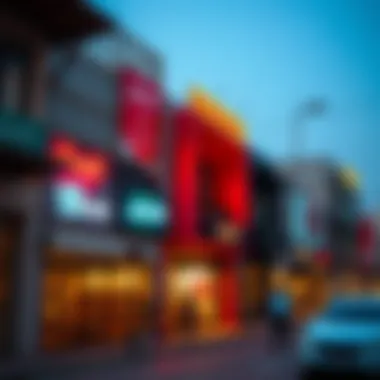
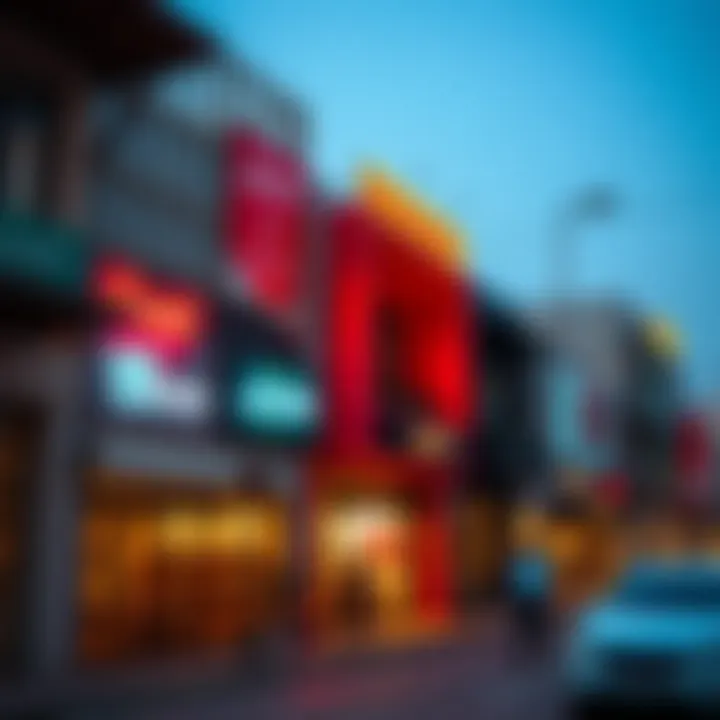
- Examples of Sustainable Features:
- Solar panels installed to harness renewable energy.
- Native plants used in landscaping to minimize water consumption.
- Smart home technologies integrated to control energy use efficiently.
These innovations are more than just trends; they signify a cultural shift towards responsible architectural practices that address the pressing challenges of climate change. The district's embrace of green building concepts not only attracts eco-conscious investors but also reflects the broader global movement towards sustainability in design practices.
In wrapping up this discussion on architectural developments, it’s clear that Dubai's Design District is positioned not just as a temporary trend but as a lasting influence on architectural philosophy. Each building and innovation within it is a stitch in the tapestry of urban evolution, weaving together culture, community, and sustainability.
For more information on sustainable architecture, check resources such as Wikipedia and Britannica.
Economic Impact of the Design District
The Design District in Dubai is not just a picturesque area filled with modern architecture and artistic expressions; it serves as a crucial driver of economic development. The significance of this district extends beyond its aesthetic qualities; it creates an ecosystem that fosters business growth, enhances property values, and attracts investments from around the globe. Ultimately, the economic impact is multifaceted, benefiting various stakeholders, including investors, homebuyers, and local entrepreneurs.
Investment Opportunities in Design and Real Estate
Dubai's Design District beckons a diverse range of investors eager to explore openings in design and real estate. The district’s atmosphere inspires creativity, attracting businesses that want to set up shop in an environment buzzing with innovation. Investors can find opportunities in:
- Office Spaces: The demand for creative office environments has surged, with companies seeking flexible spaces that reflect their brands. Businesses in sectors like design, technology, and art benefit greatly from being rooted in this vibrant hub.
- Residential Properties: As more artists and professionals flock to the area, the demand for housing rises. Investors in this sector can tap into both long-term rentals and short-term leasing markets, depending on target demographics.
- Commercial Ventures: Showrooms, galleries, and boutique stores thrive in the Design District. Establishing a presence here means reaching an audience that values creativity and quality.
Moreover, localized events and festivals draw both tourists and locals, boosting foot traffic and sales for nearby businesses. Investors should also be keen on upcoming projects and developments sprawling across the Design District, which are designed with both aesthetics and functionality in mind. Building projects, like those led by established firms, often generate significant returns.
Contribution to Dubai's Economy
The Design District plays a pivotal role in reinforcing Dubai's status as a global metropolis. Its contribution is visible in various strains of the local economy:
- Job Creation: By attracting numerous creative corporations and startups, the district creates thousands of jobs. This not only reduces unemployment but also enriches the local talent pool as professionals from diverse sectors converge in this space.
- Tourism Growth: Featuring art festivals, exhibitions, and lifestyle events, the district attracts both international tourists and local residents, translating into increased spending in hotels, restaurants, and shops.
- Enhanced Brand Image: The presence of avant-garde architecture and cutting-edge design strengthens Dubai's global brand as a leader in innovation and luxury, further enticing investments from foreign entities.
The Design District is not simply a cluster of buildings; it is a dynamic economic engine driving progress and creativity in Dubai.
In summary, the economic implications of the Design District are profound and far-reaching. Investors and stakeholders who engage with this community unlock significant potential, while also influencing the broader economic landscape of Dubai. The investment opportunities and contributions to the local economy underscore why this area is vital to both current and future developments.
Community and Lifestyle Aspects
The Design District in Dubai is more than just a place for industry and commerce; it nurtures a vibrant community imbued with creativity, collaboration, and culture. As we dive into the community and lifestyle elements within this hub, it becomes crystal clear that these aspects are vital not just for the local inhabitants but also for investors and developers seeking to tap into a flourishing ecosystem.
The district's layout is designed to promote interaction among its residents, creatives, and entrepreneurs. This connectivity reveals itself through numerous galleries, studios, and creative spaces, which foster an environment where ideas can flourish and innovative projects come to life. Artists and designers converge here, transforming raw concepts into tangible works that showcase Dubai’s evolving artistic narrative.
Key benefits to consider include how a robust community stimulates economic growth, yielding higher demand for residential properties and commercial spaces. When individuals feel a sense of belonging, they are often willing to invest more in their surroundings, enhancing the attractiveness of the locale for prospective buyers and investors alike.
Furthermore, as lifestyles evolve, having a neighborhood that embraces diverse amenities becomes crucial. The Design District offers a variety of dining and retail experiences, blending international flavors with local charm, thus enriching the community fabric. This combination of experiences not only draws tourists but also anchors residents, providing a lifestyle that’s both convenient and exciting.
Galleries, Studios, and Creative Spaces
The heart of any thriving artistic community lies in its galleries, studios, and creative spaces. In the Design District, you can find a range of these hubs, each one offering a unique take on creativity and innovation. They serve as incubators for artists and designers at different stages of their careers, from emerging talents to established names.
For instance, you might wander into The JamJar, a contemporary art gallery that prioritizes not just exhibitions, but also educational programs and creative workshops. Such spaces encourage local artists to showcase their work while providing them the tools to grow in their craft.
Additionally, studios like Tasmeem offer resources for design students and professionals alike, brimming with opportunities for collaboration and networking. These communal settings create networking opportunities that can lead to partnerships, exhibitions, or even commercial ventures.
The vibrancy of these creative spaces contributes not only to the district's aesthetics but also to its cultural identity, making it a significant draw for both local and international visitors who seek inspiration or simply want to immerse themselves in Dubai's burgeoning art scene.
Dining and Retail Experiences in the Area
Dining and retail experiences in the Design District play a pivotal role in shaping its community lifestyle. The amalgamation of diverse culinary options and unique retail outlets creates an engaging atmosphere, which is particularly attractive to both residents and visitors.
Imagine a Saturday morning spent perusing a local designer's selection at Boutique 1, followed by a light brunch at Naked Influencer—a chic eatery that serves health-conscious meals appealing to various tastes and preferences. These venues do more than serve food or products; they build social hubs where people gather to share ideas and foster relationships.
Moreover, markets and pop-up events, like the Dubai Design Market, showcase the talents of local artisans and entrepreneurs, bringing together a plethora of creative goods and culinary delights. This not only encourages community engagement but reinforces a local economy that thrives on supporting homegrown talent.
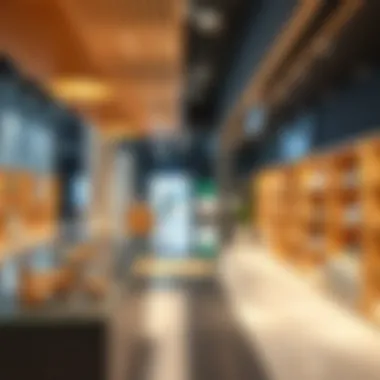
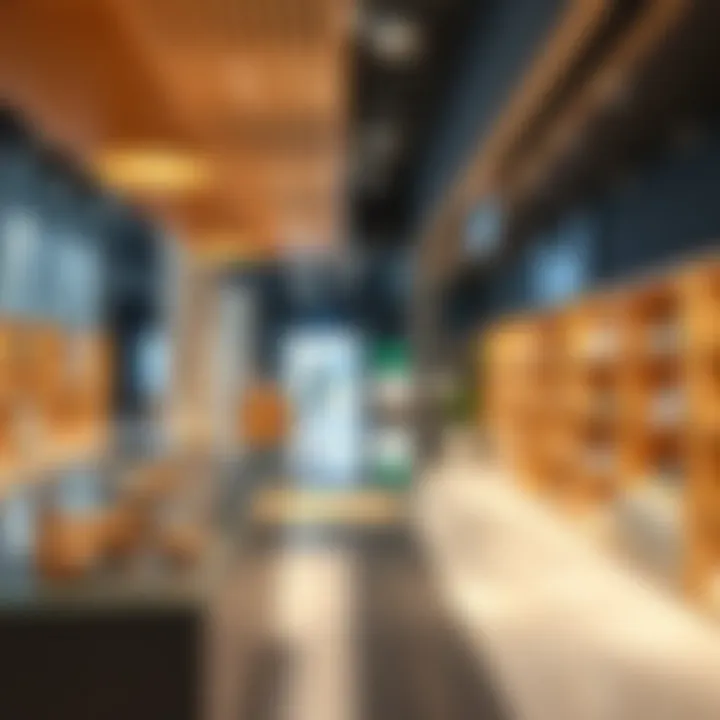
In essence, the blend of shopping and dining here isn't merely transactional; it’s an experience. It encapsulates the essence of the Design District—a space where lifestyle, creativity, and commerce converge, promoting an enduring sense of community that is vital for its sustainable growth.
Navigating the Design District
Navigating through the Design District in Dubai is more than just finding your way from point A to point B; it’s an engaging experience filled with creativity, innovation, and interaction. This district isn’t just a physical space; it embodies a lifestyle and a thriving community of like-minded individuals. Understanding its transportation network and accessibility options is crucial, especially for investors, homebuyers, agents, analysts, and developers who are looking to immerse themselves in this unique ecosystem.
Transportation and Accessibility
Accessing the Design District can be pivotal for those eager to explore its offerings. Here are some key aspects to keep in mind:
- Public Transport: Dubai boasts a well-structured public transport system. The Dubai Metro has a station at the nearby Business Bay, providing convenient access to the Design District. Taxi services and rideshare options like Uber and Careem are readily available throughout the area.
- Road Infrastructure: Situated just minutes from key highways like Sheikh Zayed Road, the Design District is easily accessible by car. Ample parking spaces are provided for visitors, making it a comfortable endeavor to drive in and out.
- Bicycle Paths: With sustainability in mind, the district includes well-mapped bicycle paths. Cycling is an increasingly popular mode of transport, allowing locals and visitors alike to traverse the district while enjoying the picturesque surroundings.
- Walking-Friendly Areas: The layout of the district promotes walking, with pedestrian-friendly pathways connecting various attractions. This feature encourages exploration and interaction among the community members and visitors.
It's not just about how you get there; it’s about the journey itself. As you travel through the district, you will find a plethora of art installations, cafes, and boutiques that enhance the experience, making it worthwhile beyond mere destination.
Tips for Visitors and New Residents
While exploring the Design District, whether you’re a visitor or a new resident, a few practical tips can significantly enhance your experience:
- Plan Your Visit: The district is home to several galleries and events. Check the local calendar for exhibitions and workshops that may be taking place. This can give you a chance to engage with artists and fellow art enthusiasts.
- Explore Beyond the Surface: Don’t just stick to the main attractions. Venture into the alleyways and smaller galleries; some of the most intriguing pieces may not be in the listed venues.
- Stay Updated on Community Events: Subscribing to local newsletters can keep you informed about upcoming community events, cultural festivals, and workshops.
- Networking Opportunities: If you’re involved in the design community or related fields, mingle with local professionals at networking events or community gatherings. Establishing connections can lead to fruitful collaborations.
- Mind the Climate: Dubai is known for its warm weather. If you’re visiting during the summer months, plan your outdoor activities for the cooler times of the day. Hydration is key!
In summary, navigating the Design District involves not only understanding how to get there but also engaging with its vibrant community and rich artistic scene. As you immerse yourself in the area, you will discover that it’s more than just a design hub; it’s a lively crossroads of creativity, innovation, and collaboration.
The Future of the Design District
The Design District stands as a canvas for innovation and creativity, but what lies ahead is equally important. As Dubai advances into the future, the Design District is expected to evolve significantly, reflecting broader trends in design, technology, and urban development. Investment prospects here could be quite enticing for investors, homebuyers, and developers with eyes on the next big thing. Understanding the future trajectory of this district can provide critical insights into potential returns and engagement opportunities.
Upcoming Projects and Developments
Several forthcoming projects are poised to enhance the appeal and functionality of the Dubai Design District. Here are some noteworthy developments expected to make waves in the near future:
- Cultural Hub Expansion: The introduction of a larger cultural center that will not only house galleries but also provide spaces for workshops, exhibitions, and performances could further entrenched the district's reputation as a creative destination.
- Green Spaces Initiative: Plans are afoot to incorporate more parks and green areas, encouraging sustainable urban living and improving residents' quality of life. This aligns with Dubai’s vision of becoming a more eco-friendly metropolis.
- Smart Technology Integration: New buildings are likely to feature cutting-edge smart technology. This could range from energy-efficient systems to advanced security measures, elevating the experience for both businesses and residents.
"The foresight of integrating sustainability and technology will create a dynamic environment that adapts to future needs."
These upcoming projects signal a concerted effort to maintain the Design District's status as a frontrunner in creativity and innovation. For investors, these developments present ripe opportunities for engagement.
Trends Shaping the Future of Design in Dubai
Several trends are anticipated to shape the landscape of design in the region, offering valuable context for stakeholders:
- Sustainability and Eco-Conscious Design: As environmental concerns rise, cultural shifts are pushing designers toward more sustainable practices. Materials that reduce waste and energy consumption are gaining ground, reshaping how projects are conceptualized.
- Collaboration Across Disciplines: The blending of architecture, art, and technology is becoming more common. This crossover approach not only fosters creativity but also encourages diverse perspectives, enriching projects with innovative ideas and functions.
- Focus on Community Engagement: Designs that emphasize community connection through communal spaces and activities are increasingly popular. This can strengthen social ties, making neighborhoods more inviting.
- Digital and Experiential Design: With advances in virtual reality and augmented reality, creators are exploring immersive experiences. This means interactive installations and environments that engage residents and visitors alike.
As these trends unfold, they carry implications for investors and buyers. Understanding how these elements can work together to create vibrant spaces is crucial for making informed decisions in the Design District. The future beckons with challenges, yes, but also immense potential.
Closure
The conclusion of this article stitches together the multi-faceted narrative of Dubai's Design District, underscoring its significance not only as a creative hub but also an economic powerhouse. With its rich blend of artistry, innovation, and architectural marvel, the district is far more than just a series of buildings; it embodies the ethos of a society in transition, a microcosm where tradition meets cutting-edge design.
The Design District is where imagination takes flight, and realities are sculpted by visionaries. This region serves as a fertile ground for creativity to thrive.
Recapping the Significance of the Design District
A recap of the insights presented throughout the article highlights several core elements that illustrate the unparalleled importance of the Design District within Dubai. First, it stands as a vibrant platform fostering local and international talents in art and architecture. Events that take place here, from contemporary exhibitions to workshops, pull in crowds eager to experience the latest trends in creativity. Furthermore, its strategic location enhances accessibility, bringing together designers, investors, and potential homebuyers in a conducive environment for collaboration.
In addition, we shouldn't overlook the balance of aesthetics and functionality in architectural designs prevalent in the area. Buildings such as the Dubai Design Academy and Art Dubai encapsulate this philosophy, blending utility with striking design elements.
Moreover, the economic impact is significant as the district attracts investments from several key stakeholders looking to partake in Dubai’s ongoing transformation. This results in opportunities for growth and engagement, positioning the Design District not just as a place for creative endeavors but also as a central economic player in the larger context of the emirate's development.
Final Thoughts on Investment and Engagement
As we peer into the future, the Design District is likely to see some remarkable changes. The potential for investment is substantial and continually evolving—much like the very designs and artworks that adorn its spaces. Investors should consider the sustainability initiatives and collaborative projects that are setting the stage for long-term growth opportunities.
Engagement for both local and international participants promises robust returns, suggesting that positioning oneself within this artistic enclave could yield unmatched benefits. This aligns with the growing trend of experiential design, which appeals to an audience seeking not only products but captivating interactions that evoke emotions and memories.
In synthesis, the Design District of Dubai is a tapestry woven with threads of creativity, culture, economic vitality, and social collaboration. Understanding its dynamics offers invaluable insights for investors, homebuyers, and industry professionals aiming to leverage the strengths of this unique landscape.
